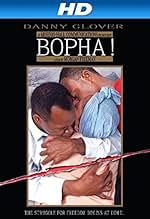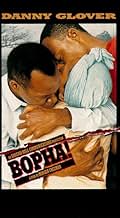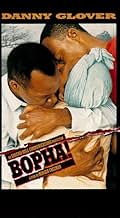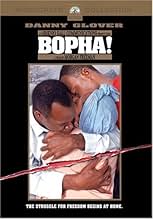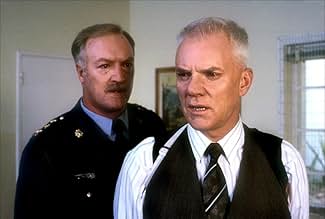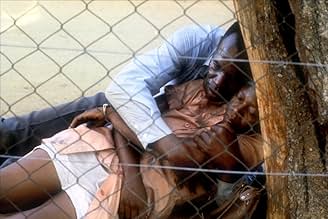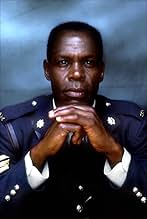VALUTAZIONE IMDb
6,5/10
1052
LA TUA VALUTAZIONE
Micah Mangena è seduto sopra una polveriera e non lo sa. È un sergente della polizia sudafricana, un sostenitore del potere. Ma i conflitti che dilaniano il Sudafrica del 1980 stanno per far... Leggi tuttoMicah Mangena è seduto sopra una polveriera e non lo sa. È un sergente della polizia sudafricana, un sostenitore del potere. Ma i conflitti che dilaniano il Sudafrica del 1980 stanno per fare a pezzi il mondo di Micah.Micah Mangena è seduto sopra una polveriera e non lo sa. È un sergente della polizia sudafricana, un sostenitore del potere. Ma i conflitti che dilaniano il Sudafrica del 1980 stanno per fare a pezzi il mondo di Micah.
- Regia
- Sceneggiatura
- Star
- Premi
- 3 candidature totali
Julie Strijdom
- Lucy Van Tonder
- (as Julie Stridom)
Recensioni in evidenza
Bopha! is surprisingly quite a memorable and inspiring film about the troubled years in South Africa. One of my favorite actors, Malcolm McDowell was as ever brilliant playing the evil policeman. The problem is that I and many others are used to seeing McDowell as an anti-hero and by casting him as such a nasty role as he plays in this film, you do not feel as shocked and disgusted by his actions as you should do.
Although Bopha! is somewhat moving, and it's certainly about an important historical subject, it should have been much more moving than it is, and I don't give films extra points for their non-filmic references, no matter how important the subject is. Looking at the film purely as a self-contained artwork, it has a fair share of problems, including characterization and other script deficiencies as well as oddly flat direction.
The setting of the film is South Africa in 1980, in the Moroka section of Soweto, on the outskirts of Johannesburg (although in reality it was shot in Zimbabwe, since Apartheid had not yet ended while filming--that didn't occur until 1994). Historically, 1980 was somewhat of a middle period of internal opposition to Apartheid, which the South African government had begun to press even harder in the 1960s, leading to increasing protests and demonstrations and their attendant violence throughout the 1970s and 1980s.
Bopha! was originally a play by South African writer Percy Mtwa, and was earlier made into a semi-documentary television program that aired on PBS in the United States in 1986. Compared to the play, the film, directed by Morgan Freeman (his only directorial turn to date) significantly changes many of the characters, much of the story, and even the ending, which here is appropriately far more troubled and ambiguous than the "ray of hope" ending of the play.
The story is centered on Micah Mangena (Danny Glover) and his family, wife Rosie (Alfre Woodard) and son Zweli (Maynard Eziashi). Micah is trying to better his family with his income as a policeman, but it's a time when black policeman are seen as traitors to their own people, since they're enforcing the laws of Apartheid. The negative attitude towards them, approaching ostracism and in some cases lynching, even carries over to policeman's families. Despite the risk and periodic threats, Micah hopes that Zweli will follow in his footsteps, as it is a more desirable choice than the alternatives, and at first, Zweli plans to. But in school, Zweli's friends gain courage to organize protests, and Zweli helps them out by arranging a meeting with a famed local anti-Apartheid activist, Pule Rampa (Malick Bowens). Rampa is considered a "terrorist" by the authorities, and merely meeting to discuss such political issues is against the law, so turmoil quickly follows and ends up forcing father and son on different sides of the law.
Although Micah gets a lot of screen time and we learn something about the character, Freeman is unable to overcome an emotional distancing that makes it difficult to become invested as a viewer. Rosie and Zweli get less screen time, and feel even more distant. This especially hurts in the case of Zweli, as his character arc is essential to the impact of the film. For a large chunk of the middle, Zweli inexplicably disappears. The more minor characters can become completely lost and it is not always easy to keep track of them. It's difficult to not feel that Marius Weyers, as Micah's boss Van Tonder--the mostly understanding white guy, and Malcolm McDowell, as the villainous De Villers, aren't largely wasted. This is not to say that the events in the film involving all of the principal characters are not impactful, or that the actors do not turn in decent performances, but there just seems to be something relatively ineffable missing in the "chemistry" between performance, direction, script and editing.
I found it odd that one reviewer described Bopha! as an "action" film. Yes, there are scenes of protests turning to violence, there are scenes of protesters running from the police, being chased and occasionally being shot and so forth, but these are not at all the focus of the film. Far more often, Freeman goes about his realist drama story very deliberately. Some viewers--my wife was one--may feel that the film is too slow. And consider that my wife is from South Africa--she lived in the government's Indian settlement, Lenasia, right next to Soweto, and experienced similar events! So it's not that she was not interested in the material.
Freeman's directorial style is fairly pedestrian. He blocks scenes and conveys actions clear enough. He is rarely "showy" with his cinematography, although there are a couple shots of nice scenery, a nice wide shot of the township standing in for Soweto, a couple shots of sunsets and such. But this is a film that wants to hinge solely on its performances and on a heart-wrenching story in a complex time of turmoil. There are moments, such as a death in jail, a burned structure, characters who are shot, shot at and stabbed, and so on that should be as powerful as just about anything one can see in the cinema. But something about the story just doesn't click. It just feels too lightweight for what it should be, and consider this--I'm a viewer who very easily becomes emotional with such material; I very easily cry when I watch films. Unfortunately, I didn't shed a tear while watching Bopha!
Still, the subject and its handling are competent enough, and the historical content important enough to warrant a slight recommendation, especially for anyone who wants or needs to get a small glimpse into what Apartheid was about. The best film about Apartheid-era South Africa has not yet been made but needs to be. Until then, Bopha! and a handful of others, such as Cry Freedom (1987) and Mandela (1987), will have to suffice.
The setting of the film is South Africa in 1980, in the Moroka section of Soweto, on the outskirts of Johannesburg (although in reality it was shot in Zimbabwe, since Apartheid had not yet ended while filming--that didn't occur until 1994). Historically, 1980 was somewhat of a middle period of internal opposition to Apartheid, which the South African government had begun to press even harder in the 1960s, leading to increasing protests and demonstrations and their attendant violence throughout the 1970s and 1980s.
Bopha! was originally a play by South African writer Percy Mtwa, and was earlier made into a semi-documentary television program that aired on PBS in the United States in 1986. Compared to the play, the film, directed by Morgan Freeman (his only directorial turn to date) significantly changes many of the characters, much of the story, and even the ending, which here is appropriately far more troubled and ambiguous than the "ray of hope" ending of the play.
The story is centered on Micah Mangena (Danny Glover) and his family, wife Rosie (Alfre Woodard) and son Zweli (Maynard Eziashi). Micah is trying to better his family with his income as a policeman, but it's a time when black policeman are seen as traitors to their own people, since they're enforcing the laws of Apartheid. The negative attitude towards them, approaching ostracism and in some cases lynching, even carries over to policeman's families. Despite the risk and periodic threats, Micah hopes that Zweli will follow in his footsteps, as it is a more desirable choice than the alternatives, and at first, Zweli plans to. But in school, Zweli's friends gain courage to organize protests, and Zweli helps them out by arranging a meeting with a famed local anti-Apartheid activist, Pule Rampa (Malick Bowens). Rampa is considered a "terrorist" by the authorities, and merely meeting to discuss such political issues is against the law, so turmoil quickly follows and ends up forcing father and son on different sides of the law.
Although Micah gets a lot of screen time and we learn something about the character, Freeman is unable to overcome an emotional distancing that makes it difficult to become invested as a viewer. Rosie and Zweli get less screen time, and feel even more distant. This especially hurts in the case of Zweli, as his character arc is essential to the impact of the film. For a large chunk of the middle, Zweli inexplicably disappears. The more minor characters can become completely lost and it is not always easy to keep track of them. It's difficult to not feel that Marius Weyers, as Micah's boss Van Tonder--the mostly understanding white guy, and Malcolm McDowell, as the villainous De Villers, aren't largely wasted. This is not to say that the events in the film involving all of the principal characters are not impactful, or that the actors do not turn in decent performances, but there just seems to be something relatively ineffable missing in the "chemistry" between performance, direction, script and editing.
I found it odd that one reviewer described Bopha! as an "action" film. Yes, there are scenes of protests turning to violence, there are scenes of protesters running from the police, being chased and occasionally being shot and so forth, but these are not at all the focus of the film. Far more often, Freeman goes about his realist drama story very deliberately. Some viewers--my wife was one--may feel that the film is too slow. And consider that my wife is from South Africa--she lived in the government's Indian settlement, Lenasia, right next to Soweto, and experienced similar events! So it's not that she was not interested in the material.
Freeman's directorial style is fairly pedestrian. He blocks scenes and conveys actions clear enough. He is rarely "showy" with his cinematography, although there are a couple shots of nice scenery, a nice wide shot of the township standing in for Soweto, a couple shots of sunsets and such. But this is a film that wants to hinge solely on its performances and on a heart-wrenching story in a complex time of turmoil. There are moments, such as a death in jail, a burned structure, characters who are shot, shot at and stabbed, and so on that should be as powerful as just about anything one can see in the cinema. But something about the story just doesn't click. It just feels too lightweight for what it should be, and consider this--I'm a viewer who very easily becomes emotional with such material; I very easily cry when I watch films. Unfortunately, I didn't shed a tear while watching Bopha!
Still, the subject and its handling are competent enough, and the historical content important enough to warrant a slight recommendation, especially for anyone who wants or needs to get a small glimpse into what Apartheid was about. The best film about Apartheid-era South Africa has not yet been made but needs to be. Until then, Bopha! and a handful of others, such as Cry Freedom (1987) and Mandela (1987), will have to suffice.
Incredible tension from a fevered conflict of races, generations, and police-and-citizens. Morgan Freeman proves himself a great director: the acting from the cast is flawless and strong, and some of the camera set-ups are indelible. There's a short shot where an armored car is roaring toward a phone pole, behind which Alfre Woodward is crouching in terror, that is truly magnificent! Hollywood often ignores superb directorial talent: Charles Laughton only directed one film, Orson Welles had a hell of a time. Yet there are so many mediocre films which lose money! Somebody please jam a good script into Mr. Freeman's hand and stick him behind a camera!
It is 1980 South Africa. Micah Mangena (Danny Glover) is a black police officer. He is honest and dutiful. He trains the younger black cops. His wife Rosie (Alfre Woodard) is maid in a white household. His son Zweli (Maynard Eziashi) is losing faith in his father as politcal pressure builds and revolts mount. Van Tonder (Marius Weyers) is his friendly white superior officer. As conflicts rise, secret police De Villiers (Malcolm McDowell) leads a brutal crackdown.
Directed by Morgan Freeman, this is a solid film about living under apartheid. Nelson Mandela was released in 1990. An election would be held a year after this movie. In a way, this may have caught the public at the wrong time as the world was looking forward. Nevertheless, this is a well made film with solid performances.
Directed by Morgan Freeman, this is a solid film about living under apartheid. Nelson Mandela was released in 1990. An election would be held a year after this movie. In a way, this may have caught the public at the wrong time as the world was looking forward. Nevertheless, this is a well made film with solid performances.
BOPHA! you SUCKA! I wasn't really sure if I'd like the movie -- and I certainly did not. A film that knocks you out just after watching it. Not for the squeamish. Whatever you may have seen in your life or even whatever you will see in the future, I can predict that no movie will ever give you the same feeling as this. The screenplay is intelligent, focused and clever. I much enjoyed this film, mostly because of the convincing characters, especially the man with "man manners." I'll be honest, I have never been courageous enough to watch a movie like this. It's worth seeing for some inventive uses of sound and the actors. Final rating equals 7/10.
Lo sapevi?
- QuizMorgan Freeman's film-directing debut.
- Colonne sonorePIRI WANGO IYA
Written and Performed by Geoffrey Oryema
Courtesy of Realworld Records, Ltd./Virgin Records America, Inc.
I più visti
Accedi per valutare e creare un elenco di titoli salvati per ottenere consigli personalizzati
- How long is Bopha!?Powered by Alexa
Dettagli
Botteghino
- Budget
- 12.000.000 USD (previsto)
- Lordo Stati Uniti e Canada
- 212.483 USD
- Fine settimana di apertura Stati Uniti e Canada
- 88.390 USD
- 26 set 1993
- Lordo in tutto il mondo
- 212.483 USD
- Tempo di esecuzione2 ore
- Colore
- Proporzioni
- 1.85 : 1
Contribuisci a questa pagina
Suggerisci una modifica o aggiungi i contenuti mancanti



